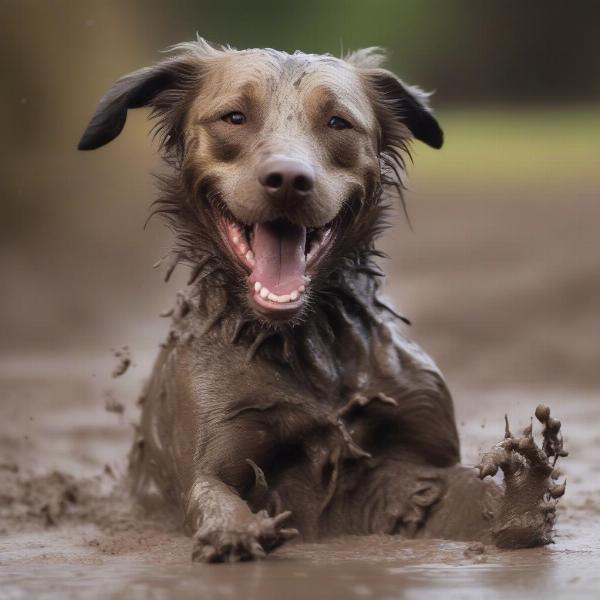A “dirty dog” can mean many things. Perhaps your furry friend has rolled in something unpleasant, enjoys a good mud puddle, or simply needs a routine bath. This article will cover everything you need to know about keeping your dog clean, from addressing unexpected messes to establishing a regular grooming routine.  Dog rolling in mud
Dog rolling in mud
Why is Regular Cleaning Important?
Keeping your dog clean isn’t just about aesthetics. Regular grooming helps prevent skin issues, removes parasites, and allows you to check for any lumps, bumps, or injuries. A clean dog is a healthier and happier dog! Additionally, regular cleaning can help reduce shedding and minimize the spread of allergens in your home.
Dealing with the Unexpected Mess
Sometimes, your dog’s adventures lead to unexpected messes. Whether it’s a skunk encounter, a romp in a manure pile, or simply a muddy puddle, you need to know how to handle it. dirty dog garage offers some helpful tips on dealing with these situations.
For particularly pungent smells, like skunk spray, a mixture of baking soda, dish soap, and hydrogen peroxide can be effective. However, always consult with a veterinarian before using any home remedies, especially if your dog has sensitive skin.
Establishing a Grooming Routine
The frequency of bathing depends on your dog’s breed, coat type, and lifestyle. Some dogs require weekly baths, while others can go several months between washes. Over-bathing can strip their skin of natural oils, leading to dryness and irritation. Consult with a groomer or veterinarian to determine the best bathing schedule for your dog.
Brushing is an essential part of any grooming routine. Regular brushing helps remove loose fur, prevents mats, and distributes natural oils, keeping your dog’s coat healthy and shiny.
Bath Time Basics
Bathing your dog can be a bonding experience if done correctly. Use lukewarm water and a dog-specific shampoo. Avoid getting water in your dog’s ears, and be sure to rinse thoroughly to prevent shampoo residue.
Beyond the Bath: Ears, Nails, and Teeth
Cleaning your dog’s ears, trimming their nails, and brushing their teeth are also crucial aspects of grooming. dirty dogs grooming can offer professional services for these tasks if you are uncomfortable doing them yourself. Regular ear cleaning helps prevent infections, while nail trimming keeps your dog comfortable and prevents joint issues. Dental care is equally important and can help prevent dental disease.
“Regular ear cleaning is as crucial as bathing,” says Dr. Emily Carter, DVM. “It can prevent painful ear infections and keep your dog comfortable.”
Choosing the Right Grooming Tools
Selecting the right grooming tools is essential for effective and safe grooming. Brushes, combs, shampoos, and nail clippers are all available in various types and sizes. Choose tools appropriate for your dog’s breed and coat type. dirty dog sunglasses nz, though not related to grooming, reminds us of the importance of protecting our dogs from the elements, just as good grooming protects their skin and coat.
Professional Grooming Services
If you’re short on time or simply prefer to leave grooming to the professionals, consider hiring a groomer. dirty dog salon offers a range of grooming services to keep your canine companion looking and feeling their best. A professional groomer can handle everything from basic baths to breed-specific haircuts.
Keeping Your Home Clean
A clean dog contributes to a clean home. doormat dirty dog can help minimize the amount of dirt and debris tracked into your house. Regular vacuuming and cleaning can also help maintain a clean and allergen-free environment.
“A dedicated dog doormat can significantly reduce the amount of dirt brought in from outside,” says professional dog trainer, Mark Johnson. “It’s a simple solution that makes a big difference.”
Conclusion
Keeping your “dirty dog” clean is about more than just appearances. Regular grooming contributes to your dog’s overall health and well-being. From dealing with muddy paws to establishing a regular grooming routine, a little effort goes a long way in keeping your canine companion happy and healthy.
FAQ
- How often should I bathe my dog? The frequency of bathing depends on your dog’s breed, coat, and lifestyle. Consult with a groomer or veterinarian.
- What type of shampoo should I use? Always use a dog-specific shampoo to avoid skin irritation.
- How can I prevent ear infections? Regular ear cleaning can help prevent infections.
- Is professional grooming necessary? While not always necessary, professional grooming can be beneficial, especially for certain breeds or if you’re uncomfortable performing certain tasks yourself.
- How can I keep my house clean with a dog? Regular vacuuming, cleaning, and a dog doormat can help minimize dirt and allergens.
- What are the signs of a skin problem? Excessive scratching, redness, hair loss, and dry skin can be signs of a skin problem. Consult with a veterinarian.
- How can I make bath time less stressful for my dog? Positive reinforcement, treats, and a calm environment can help make bath time a more positive experience.
ILM Dog is your trusted source for expert advice on all aspects of dog care and breeding. We provide valuable insights and resources to help you navigate the journey of dog ownership, from choosing the right breed to ensuring their health and well-being. Whether you’re a seasoned dog owner or just starting out, our comprehensive guides cover everything from health and nutrition to training and behavior. For tailored advice on dog breeds, healthcare, training, nutrition, grooming, and products, contact us at [email protected] or call +44 20-3965-8624. ILM Dog is dedicated to helping you provide the best possible care for your beloved companion.